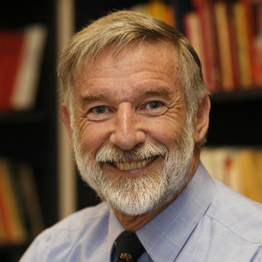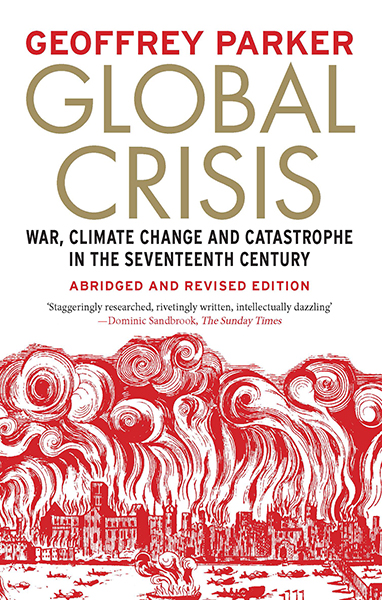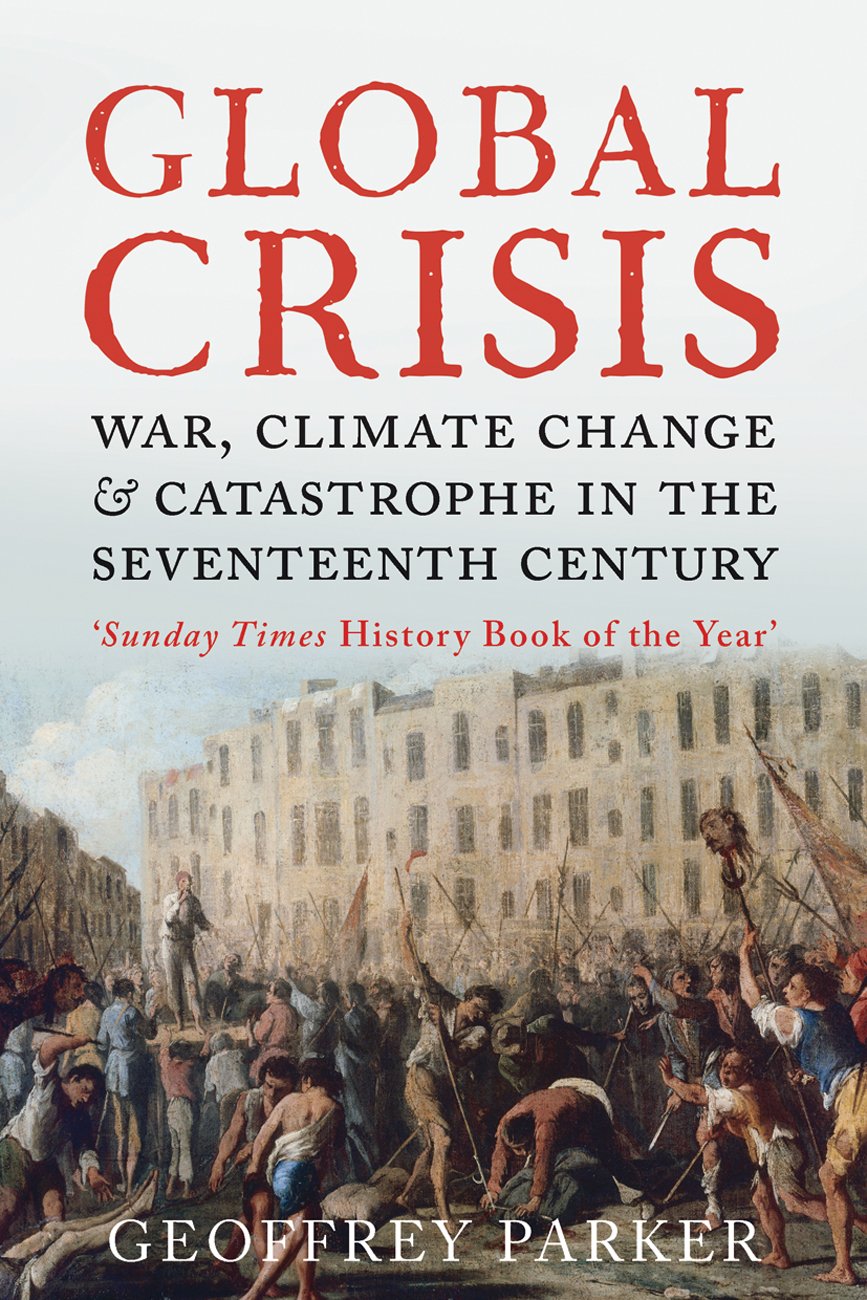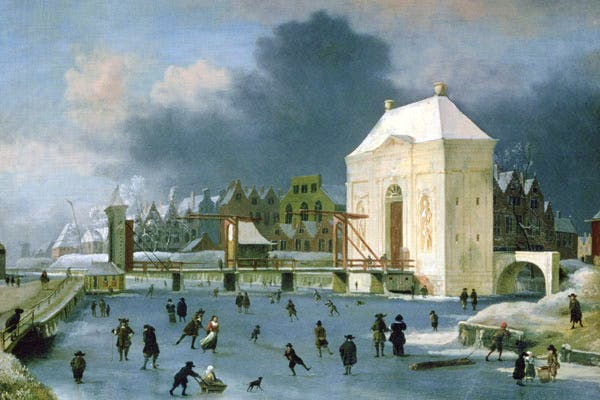Geoffrey Parker, Global Crisis (2017) – Global History Reading Group
Published: 11 December 2017 - Adrianna Catena & Guido van Meersbergen
In its 1983 report entitled Climate Change, the Carbon Dioxide Assessment Committee commissioned by the US Congress cheerily concluded that ‘the direct effects of more CO2 in the air are beneficial’.[1] Despite predictions of rapid global warming, rising sea levels, and decreasing crop yields, the report’s suggestion that people would simply adapt to climatic changes set the tone for three decades of underestimation (if not outright denial) of the effects of climate change. As British historian Geoffrey Parker has argued, although we know that climate-induced disasters are bound to occur, ‘we still convince ourselves that they will not happen just yet (or, at least, not to us), and so fail to take appropriate action.’
Parker’s unnerving account of policymakers always remaining ‘one disaster behind’ is as topical now as it was when his Global Crisis: War, Climate Change and Catastrophe in the Seventeenth Century was first published in 2013. Then responding to the US government’s inept response to Hurricane Katrina (2005) and similarly poor handling of Hurricane Sandy (2012), the latest string of hurricanes (Harvey, Irma, Maria) are a painful reminder of the urgency of his call ‘to prepare today or repair tomorrow’.
On Wednesday 22 November, the GHCC’s Global History Reading Group convened to discuss selected sections from Parker’s revised and abridged edition, published in July 2017. Adrianna Catena and Guido van Meersbergen report on what was a lively and instructive meeting.
The Seventeenth-Century Crisis
Life was 'nasty, brutish, and short’, Thomas Hobbes’ famous quote runs, and perhaps especially so for Hobbes’ contemporaries. The seventeenth century saw the confluence of wars, regime change, popular revolt, and natural disasters on an unprecedented, global scale. That such widespread conflict and unrest were somehow connected was a notion first put forward by Eric Hobsbawn, and consolidated by Hugh Trevor-Roper, in what rapidly became a landmark historical debate battled on the pages of Past and Present. After a fertile discussion involving some of the more eminent figures in the field, the ‘general crisis of the seventeenth century’ had, for some decades, been laid to rest.
Parker’s Global Crisis revived the debate by making two important contributions. First, in his colossal work the general crisis became for the first time truly global in scope. Thus, the English Civil War (1642-1651), the Fronde (1648-1653), and the revolts against Habsburg rule in Catalonia (1640-1659) and Naples (1647-1648) are set against the termination of Ming rule by the Qing (1644), the execution of the Ottoman sultan Ibrahim (1648), and the Mughal war of succession (1657-1659). Second, and most innovatively, Parker undertakes a sustained attempt at examining the central impact of severe weather– the so-called Little Ice Age – on the 'Global Crisis'.
In five parts and twenty-two chapters whose coverage ranges from Europe to East Asia and, briefly, Africa and the Americas, this work draws powerful links between climate change and political and social upheaval in the period from c.1618 to the 1680s. Parker is equally concerned with outcomes: the official and popular responses that shaped the ways in which each region experienced and emerged from the crisis. While dipping regularly into what he terms ‘the natural archive’ – tree rings, glaciers, ice cores, pollen deposits – the most eye-catching evidence is drawn from the ‘human archive', an extensive, multi-lingual collection of primary sources detailing contemporaries’ experiences of climate change and crisis.
Crisis and Response
It is in providing such detailed and often gripping documentation of contemporary lived experiences of disease, famine, and widespread devastation due to a toxic combination of warfare, crop failure, and extreme weather conditions, that the participants of the Global History Reading Group felt that Parker’s book has most to offer. Can historians, and perhaps early modernists in particular, afford to overlook the impact of climate? The suggestion was raised that, rather than doing climate history itself, ‘climate’, much like class or gender, might become one of these categories that all historians have to reckon with when researching the past.
Another strength highlighted in the session, was Parker’s emphasis on the role of state policies in exacerbating hardship, ultimately increasing the human toll of catastrophe. Some regions, we are reminded, fared better than others after the 'global crisis', Tokugawa Japan offering the most salient example of success, although this was also where the state implemented the most drastic and autocratic pre-emptive measures. As such, Global Crisis provides an important contribution towards a more sustained discussion of how different societies respond to crises, taking stock of different normative assessments of preparedness and risk.
Doubts remained, however, concerning the issue of causality. Parker takes care not to claim that climate change caused all the crises his book covers, yet his discussion of a wide variety of broadly contemporaneous wars, revolts, and regicides within the context of an argument for the direct relationship between natural and human-induced disaster, does raise questions regarding that argument’s global span. For instance, the mid-century Mughal succession conflict was one of only two fought out in the seventeenth century, recently interpreted as a cause for reinforcing, not weakening, Mughal power and prosperity. Likewise, the Dutch regime change of 1650 was a bloodless affair that heralded a period of Dutch primacy, not crisis. Neither event seems to have been much influenced by climate
Other participants addressed the memory bias inherent in impressionistic evidence (“it was the worst of times”), while historians of science suggested that distinctions between ‘natural’ and ‘human’ archives are problematic in principle. Moreover, it was remarked, an unintended irony of the book’s focus on severe weather conditions is that, for historians of other centuries, the message might be that climate only really matters when at its most extreme.
While there is thus doubtless scope for further research on the Little Ice Age and the impact of climate on history more generally, Parker’s book leaves no doubt as to the drastic effects an average change in global temperature of just two degrees Celsius has on agricultural output, or the attendant human cost of such change. Global Crisis thus speaks loudly to contemporary audiences, and stands in need of being widely heard.
Dr Adrianna Catena is a Leverhulme Early Career Fellow (2016-2020) at the University of Warwick. Specialising in Early Modern Spain and the Spanish Atlantic, she is currently working on her first book: ‘The Colour of Conquest: Indigo in the Iberian Atlantic,’ and on a new research project, entitled: ‘The Hatters’ Blues: A Microglobal history of New World Dyes in Early Modern Spain.’
Dr Guido van Meersbergen is a Leverhulme Trust Early Career Fellow (2016-2019) at the University of Warwick. A historian of early modern cross-cultural encounters, he is currently completing his first book, Ethnography and Encounter: The Dutch and English East India Companies in South Asia (1600-1720), while working on a new research project entitled ‘Cross-Cultural Diplomacy Compared: European Diplomats in South Asia (1600-1750)’.
[1] As cited in Geoffrey Parker, Global Crisis: War, Climate Change and Catastrophe in the Seventeenth Century (2nd. rev. ed. New Haven: Yale University Press, 2017), 513. All citations are from this edition.





